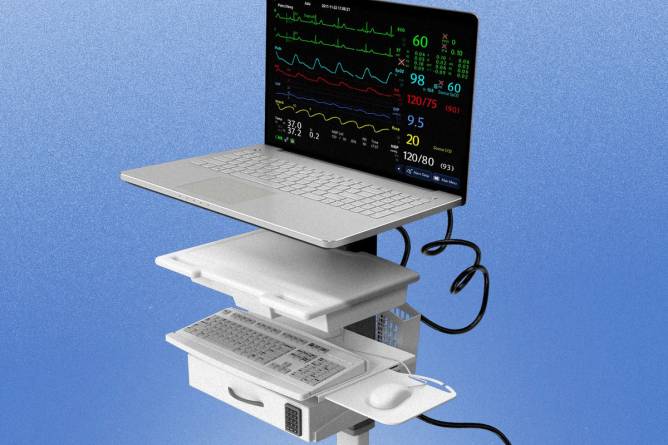|
We’re back. Last week, former Surgeon General Vivek Murthy issued an advisory declaring firearm violence a US public health crisis. Murthy cited research saying that 54% of people in the US have been impacted by a firearms incident, whether it be a threat or witnessing violence. Gun violence is the leading cause of death for children in the US, and over 48,000 people overall died from guns, according to the CDC’s latest data.
In today’s edition:
 Hudson Valley’s ‘corporate takeover’ Hudson Valley’s ‘corporate takeover’
 First week under Trump First week under Trump
 Clear your calendars Clear your calendars
—Nicole Ortiz, Cassie McGrath
|
|
|
HOSPITALS
|
On Wednesday, Optum and Summit Health union workers held a virtual town hall to discuss the “corporate takeover” of local facilities.
The virtual town hall, conducted by the 1199SEIU United Healthcare Workers East union, centered on negative employee and patient experiences since Optum, a division of UnitedHealth Group, and Summit Health acquired local facilities in New York’s Hudson Valley.
Local New York politicians, including Democratic Congressman Pat Ryan and Democratic Senator Shelley Mayer, joined the call to pledge their support for the union, with some also sharing their own experiences with both health systems.
Attendees talked about their personal struggles with high deductibles, low cost-of-living pay increases, chronic supply shortages, and long wait times for care. Words like “frustrated” and “outraged” peppered the 90-minute call of about 250 nurses, radiologists, and other medical staff.
Keep reading here.—NO
|
|
|
|
|
|
Sponsored by Calm
|
When it comes to health in the workplace, the No. 1 rule is simple: You need to consider the whole person. But what does that look like, exactly?
Glad you asked. Explore The Future of Mental Health: Personalizing Care Across a Broad Set of Health Conditions—an on-demand webinar that delves into how personalized digital health solutions can transform care for patients with diverse health needs.
Calm understands the importance of mental and physical health synchronization. That’s why this webinar dives into concrete, actionable ways your business can better support physical, emotional, and psychological well-being—to help employees thrive inside and out.
Watch the webinar.
|
|
|
EXEC ORDERS
|
Following the inauguration on Jan. 20, President Donald Trump signed a slate of executive orders that took aim at areas of health policy, from the Affordable Care Act (ACA) to artificial intelligence (AI) to drug cost cuts.
The changes could impact the healthcare industry, as the president has put his focus on a major international healthcare organization, stopped pilot programs, and potentially put millions of ACA members at risk of losing health coverage.
Michael Abrams, managing partner at health consulting firm Numerof & Associates, told Healthcare Brew that while Trump has rescinded these orders, it doesn’t mean he won’t make his own policies related to the ACA, drug pricing, or AI.
“A lot of these [executive orders] that were signed on that first and second day and so on, are about clearing the decks,” he said. “There are things that Trump wiped away with those executive orders, not because necessarily they’re unimportant to him, but because he feels the need to start fresh.”
Keep reading here.—CM
|
|
|
|
|
|
INDUSTRY AGENCIES
|
Federal health agencies are canceled—well, their meetings are at least.
In the days following his inauguration, President Donald Trump’s administration asked officials within the Department of Health and Human Services (HHS)—which has a $1.7 trillion budget and includes the FDA, the CDC, and the National Institutes of Health (NIH)—to stop all external communication, according to an internal memo. This means no new health advisories, social media posts, or website posts.
“As the new administration considers its plan for managing the federal policy and public communications processes, it is important that the president’s appointees and designees have the opportunity to review and approve any regulations, guidance documents, and other public documents and communications (including social media),” the memo read.
The pause began on Jan. 21, and according to the memo, will remain in effect until Feb. 1.
Keep reading here.—CM
|
|
|
|
|
|
Together With HSBC
A vision for the future of healthcare. Interested in understanding what investors are focused on? HSBC Innovation Banking has the industry know-how + expertise to help scale your business. The Venture Healthcare Report offers expert sector insights for health tech, medical device, biopharma, and DX tools professionals. Read the report. |
|
|
VITAL SIGNS
Today’s top healthcare reads.
Stat: 9 and 7 years. That’s how much earlier women and men are expected to die if they’re diagnosed with ADHD, a study of 30,000 British adults found. (the New York Times)
Quote: “Saying that sex is 100% binary ignores a lot of scientific evidence to the contrary…But the bigger issue is should the government really be basing policies on outdated and overly simplistic understandings of sex that ignore decades of biomedical and psychological research?”—Francisco Sánchez, a psychologist at Arizona State University, on President Donald Trump’s declaration that there are only two genders (Stat)
Read: How anti-abortion advocates are encouraging husbands and boyfriends to report their partners. (the Washington Post)
Health hero: Enjoy an on-demand discussion with leaders at Calm and Magellan Health centered on personalizing care across a diverse set of health needs. Give it a watch.* *A message from our sponsor.
|
|
|
ADVERTISE
//
CAREERS
//
SHOP
//
FAQ
Update your email preferences or unsubscribe
.
View our privacy policy
.
Copyright ©
2025
Morning Brew Inc. All rights reserved.
22 W 19th St, 4th Floor, New York, NY 10011
|
|










